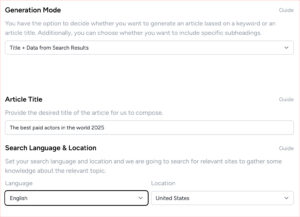Imagine you’re browsing the internet, searching for information on a topic that piques your interest.
As you sift through countless articles, blogs, and social media posts, you wonder how much of what you read is accurate and reliable. In a world teeming with information, discerning fact from fiction can be a daunting task.
This is where artificial intelligence (AI) steps in, revolutionizing the way content accuracy and reliability are assessed.
By leveraging advanced algorithms and machine learning, AI has the potential to:
- Scrutinize vast amounts of data
- Detect inconsistencies
- Ensure the credibility of the information you consume
But how does this technology work, and what are its implications for the future of content creation and consumption?
This article will guide you through the transformative impact of AI on content accuracy and reliability, offering insights into the ways it is shaping the digital landscape and your everyday information intake.
AI’s Role in Content Creation
AI is revolutionizing content creation by automating tasks that once required human effort.
With the integration of machine learning, you can significantly enhance content accuracy. Imagine not having to spend hours fact-checking; AI handles it for you through automated fact-checking systems.
These systems cross-reference multiple sources in real-time, ensuring that the information is both accurate and up-to-date.
You can leverage machine learning to analyze large datasets, identify trends, and generate content that resonates with your audience.
This technology not only improves efficiency but also boosts the reliability of your content. By employing AI, you ensure that your content maintains a high standard of accuracy, which is crucial for building credibility and trust with your audience.
Don’t overlook the power of AI in content creation.
Mastering these tools allows you to focus more on creativity and less on manual verification, making your workflow smoother and more productive.
Machine Learning Algorithms in Content Curation
Leveraging advanced algorithms, you can streamline content curation to ensure your audience receives relevant and high-quality information.
By employing machine learning, you gain the ability to:
- Sift through vast amounts of data efficiently
- Identify content that aligns with your audience’s interests
- Maintain content accuracy
Machine learning algorithms can:
- Analyze patterns and trends
- Predict what type of content will resonate most
This predictive capability is invaluable for curating content that keeps your audience engaged and informed.
Moreover, automated fact-checking mechanisms embedded in these algorithms ensure the information you distribute is accurate and reliable.
To achieve mastery in content curation, integrating machine learning into your workflow is essential. It:
- Enhances the quality of content
- Saves you time, enabling you to focus on strategic planning
By doing so, you elevate the overall credibility of your platform, establishing trust and authority with your audience.
Invest in these advanced tools to stay ahead in the competitive content landscape.
Natural Language Processing Applications
Natural Language Processing (NLP) plays a pivotal role in enhancing the quality and coherence of your written content by enabling machines to understand and generate human language effectively. By leveraging machine learning techniques, NLP helps you achieve remarkable content accuracy.
This, in turn, ensures your audience receives clear, precise, and relevant information.
When you incorporate NLP into your content creation process, you benefit from:
- Advanced text analysis
- Sentiment detection
- Context understanding
These capabilities help you produce higher-quality content that resonates with your audience. Additionally, NLP’s ability to sift through vast amounts of data enables automated fact-checking, ensuring the reliability of your information.
In essence, NLP applications empower you to refine your content, making it more engaging and trustworthy. By mastering these tools, you can elevate your writing to new heights, providing your readers with accurate and reliable information.
With NLP, you’ll find that maintaining content accuracy and consistency becomes more manageable and efficient.
Automated Fact-Checking Tools
Today’s advanced fact-checking tools leverage AI to help you verify information swiftly and accurately.
By harnessing the power of machine learning, these tools can sift through vast amounts of data to identify patterns and inconsistencies that might elude even the most diligent human researchers.
Automated fact-checking isn’t just about speed; it’s about elevating content accuracy to new heights.
Imagine the confidence you’ll have knowing your content is backed by robust verification processes.
Machine learning algorithms:
- Analyze sources
- Cross-reference claims
- Flag dubious information in real-time
This ensures you maintain the highest standards of reliability in your work.
Incorporating automated fact-checking tools into your workflow means you won’t have to second-guess the veracity of your data.
You can focus on creating impactful content, knowing that AI is tirelessly working in the background to uphold accuracy.
Embrace these tools to enhance your credibility and stay ahead in the ever-evolving landscape of information.
Enhancing Data Accuracy with AI
AI can significantly boost the precision of your data by meticulously analyzing and validating information from multiple sources.
Leveraging machine learning algorithms, you can improve content accuracy by:
- Identifying inconsistencies
- Detecting errors that might otherwise go unnoticed
These algorithms are designed to learn and adapt, enhancing their ability to distinguish between reliable and unreliable data over time.
Automated fact-checking is another powerful tool at your disposal. By integrating it into your workflow, you can:
- Swiftly verify the authenticity of information before it’s published
- Save time
- Ensure a higher standard of accuracy in your content
Moreover, AI-driven data validation tools can cross-reference information against a vast array of databases, providing a comprehensive verification process. This multi-layered approach ensures that your data is not only accurate but also reliable.
By adopting these advanced AI techniques, you’re setting a solid foundation for producing consistently accurate and trustworthy content.
AI for Real-Time Content Validation
Real-time content validation with AI allows you to instantly verify information as it’s being created or shared, ensuring immediate accuracy.
By leveraging advanced machine learning algorithms, you can enhance content accuracy and avoid the pitfalls of misinformation.
Imagine having an automated fact-checking assistant that works tirelessly in the background, scrutinizing every piece of data for authenticity.
Harnessing AI for real-time content validation means that you don’t have to wait for post-publication reviews to identify errors. Instead, the system:
- Flags discrepancies as they arise
- Offers you the opportunity to correct them on-the-fly
This proactive approach not only saves time but also builds credibility with your audience.
Machine learning models analyze vast datasets to understand the context and intricacies of the information being validated. Over time, these models become more adept, continually improving their accuracy and efficiency.
By integrating automated fact-checking into your workflow, you’ll achieve a higher level of content accuracy, ensuring that your work stands out as reliable and authoritative.
Content Filtering and AI
Effective content filtering with AI helps you sift through massive amounts of data to identify and remove irrelevant or harmful information quickly. By leveraging machine learning algorithms, you can enhance content accuracy and ensure that only pertinent data reaches your audience. This technology empowers you to create a more reliable and trustworthy information environment.
Machine learning models continuously learn from vast datasets, improving their ability to discern between valuable content and noise. These models can be trained to identify specific types of harmful content, such as:
- Misinformation
- Spam
- Explicit material
This capability safeguards the integrity of your platform.
Automated fact-checking systems operate in real-time, cross-referencing information against verified sources. This ensures the accuracy of content before it’s published.
Incorporating AI-driven content filtering not only saves you time but also significantly boosts the quality of your output. As you master these tools, you’ll find yourself better equipped to provide your audience with accurate, reliable, and high-quality information.
Impact of AI on Source Evaluation
AI revolutionizes how you evaluate sources by rapidly analyzing vast amounts of data for credibility and relevance.
When you leverage machine learning:
- It sifts through oceans of information, pinpointing the most reliable sources.
- This technology cross-references data points, ensuring content accuracy by comparing multiple sources simultaneously.
Automated fact-checking tools further enhance this process by:
- Identifying inconsistencies
- Verifying the authenticity of information in real-time
Benefits of AI in source evaluation:
- You no longer have to spend hours manually vetting sources.
- AI’s algorithms are designed to detect biases, flagging content that doesn’t meet rigorous standards.
- This allows you to focus on producing high-quality material rather than getting bogged down in the minutiae of source validation.
The speed and precision of AI-driven source evaluation mean:
- Higher efficiency
- Less room for human error
By mastering these tools, you gain a competitive edge, delivering impeccably accurate content with confidence.
Embrace AI’s capabilities to elevate your source evaluation process, ensuring your work stands out for its reliability and precision.
AI’s Contribution to Plagiarism Detection
AI significantly enhances plagiarism detection by meticulously comparing large volumes of text to identify duplications and unoriginal content.
When you leverage AI for this purpose, you’re tapping into advanced machine learning algorithms that can scan and analyze documents with incredible precision. These systems don’t just look for identical strings of text; they also detect paraphrasing and subtle similarities that might escape human reviewers.
By integrating AI-driven plagiarism detection tools, you can vastly improve content accuracy in your work. These tools use sophisticated methods to cross-reference your text against vast databases, ensuring that every piece of content is original and credible.
Moreover, AI aids in automated fact-checking, providing an additional layer of verification that bolsters the reliability of your material.
Incorporating AI into your plagiarism detection process isn’t just about catching copycats—it’s about upholding the highest standards of integrity and originality in your writing. This technology empowers you to produce work that stands out for its authenticity and trustworthiness.
Ensuring Content Reliability with AI
AI can significantly boost the reliability of your content by verifying facts and providing real-time updates.
Leveraging machine learning, you can ensure content accuracy by incorporating automated fact-checking tools into your workflow. These AI-driven tools scan vast databases to cross-reference information, ensuring that your content is not only accurate but also up-to-date.
By integrating such systems, you reduce the risk of human error and enhance the credibility of your work. Machine learning algorithms continuously improve, learning from past inaccuracies to provide even more precise results over time. This means you can trust the AI to catch errors you might miss, making your content more reliable and authoritative.
Moreover, automated fact-checking can handle a large volume of data swiftly, freeing you to focus on crafting high-quality content.
In a world where misinformation spreads rapidly, AI’s role in maintaining content accuracy is indispensable. Embrace these technologies to stay ahead in delivering trustworthy, accurate information.
Future Trends in AI and Content Accuracy
As AI technology continues to evolve, you’ll see even more sophisticated tools that enhance content accuracy and reliability.
Advanced machine learning algorithms promise to revolutionize how we approach content creation and verification. By analyzing massive datasets, these algorithms can:
- Detect inconsistencies
- Flag inaccuracies with unprecedented speed and precision
One emerging trend is the integration of automated fact-checking systems directly into content platforms. This means you’ll have instant access to verification processes as you write, ensuring that every piece of information meets high standards of accuracy.
Additionally, AI-driven tools will soon be able to cross-reference multiple sources in real-time, offering you a comprehensive view of the reliability of your content.
Moreover, the use of Natural Language Processing (NLP) will further enhance content accuracy by understanding context and nuance in human language.
As these technologies advance, you’ll find that they not only:
- Improve the quality of information
- Streamline the entire content creation process
What are the ethical considerations of using AI in content creation?
When considering the ethical aspects of AI in content creation, it’s crucial to ponder issues like data privacy, bias, and transparency.
You must ensure that the AI tools you use don’t compromise user data or perpetuate stereotypes.
It’s essential to maintain transparency about AI’s role in content creation to build trust with your audience.
By being mindful of these considerations, you can navigate the ethical challenges associated with AI in content creation effectively.
How does AI handle content in different languages and dialects?
When it comes to handling content in various languages and dialects, AI excels in its ability to analyze linguistic patterns and adapt accordingly.
By leveraging machine learning algorithms, AI can:
- Accurately translate
- Interpret
- Generate content in multiple languages with precision
Its capacity to understand nuances and context in different dialects allows for effective communication across diverse cultural backgrounds.
This makes AI a valuable tool for:
- Global content creation
- Dissemination
Can AI-generated content be legally protected under copyright laws?
Yes, AI-generated content can be legally protected under copyright laws.
As the creator of the content, you hold the rights to it and can apply for copyright protection to safeguard your work.
By registering your AI-generated content, you establish ownership and can take legal action against any unauthorized use.
Steps to ensure legal protection:
- Document the creation process.
- Keep records of the AI’s involvement in generating the content.
These measures will help in establishing the authenticity and originality of your work.
Conclusion
In conclusion, AI is transforming the landscape of content accuracy and reliability.
From creating and curating content to fact-checking and plagiarism detection, AI is revolutionizing how information is processed and validated.
Key areas where AI is making an impact:
- Creating and curating content
- Fact-checking
- Plagiarism detection
As technology advances, the integration of AI in content creation and verification will continue to enhance the trustworthiness and quality of information available to users.
Stay tuned for exciting developments in AI and content accuracy in the future.





